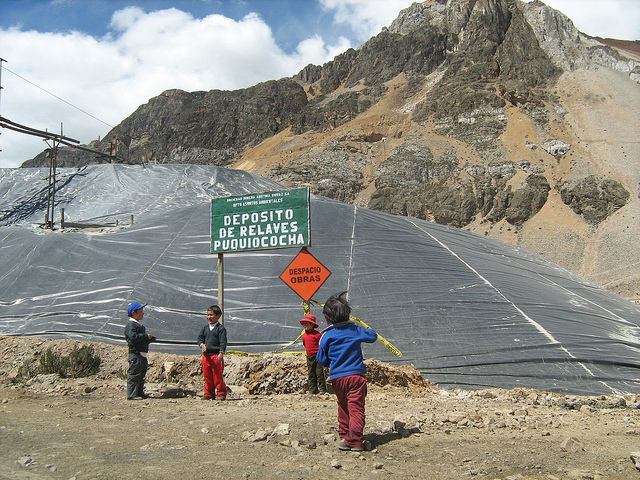People's Tribunal Hopes Verdict on Mining Abuses Gains Traction

UNITED NATIONS, Jan 30 (IPS) - A recent case study on Canadian mining abuses in Latin America has woven one more thread of justice in the tapestry of international law.
The Permanent Peoples' Tribunal (PPT) has found five Canadian mining companies and the Canadian government responsible for human rights violations in Latin America, including labour rights violations, environmental destruction, the denial of indigenous self-determination rights, criminalisation of dissent and targeted assassinations.
Gianni Tognoni was one of eight judges in the decision, and has been secretary general of the PPT since its inception in 1979.
In an interview with IPS, he spoke about how the PPT's claims have previously become part of the international debate.
"And in the experience of the Tribunal, that has been happening in different ways," he said.
Out of many examples, he cited the case of child slave labour in the apparel industry, which was denounced by the tribunal, and which was "taken up in order to strengthen the controls and the monitoring by NGOs of the conditions that were there".
The big panorama, he said, shows that "whatever could be done is being done… in order to integrate the tribunal with other forces… in order to formulate in juridically solid terms the claims".
International processes are rarely rapid, he said, articulating that the judgement on the former Yugoslavia would "appear to be more a kind of judgement on the memory, the same is true for Rwanda".
He contrasted that to the immediate effectiveness of economic treaties, and also brought up the well-known clash between human rights and transnational corporations, and the latter's attitude of impunity.
"It's not possible to have a global society which is progressively responding only to the economic criteria and the economic indicator," he summed up.
Formally, Canada is expected to uphold the same rights abroad as at home, in accordance with the Maastricht Principle under which public powers are supposed to monitor non-state actors.
"But they simply fail to do that," Tognoni said.
The 86-page ruling reports that 75 per cent of mining companies worldwide are based in Canada, and that Canadian companies with estimated investments of over 50 billion dollars in Latin America's mining sector represent 50-70 per cent of mining activities in that region.
"And the verdict in Canada is clearly showing Canada outside is favouring the violation of fundamental human rights," Tognoni said.
The PPT on the session on Canadian mining delivered the guilty verdict in Montreal on Dec. 10, 2014 – Human Rights Day – in an ongoing investigation until 2016.
So far, it has made recommendations to the Canadian government, the mining companies in question, as well as international agencies and bodies including 22 divisions of the U.N. Human Rights Council.
Access to justice is a long-term effort
The PPT's efforts are long-term ones.
"It is clear that it is important to organize the movement of opposition in order to give a strong also juridical support to the political and social arguments so that it would be clear that the battle for international justice is absolutely the same as the battle for internal democracy. Because the two things are more and more linked. There are no more countries which are independent from the international scene," Tognoni said.
PPT sessions "serve to add to that body of work to demonstrate that there is a crying need for instruments that will provide access to justice", co-organiser of the PPT session on Canadian Mining in Latin America, Daniel Cayley-Daoust, told IPS.
"The Permanent Peoples' Tribunal is not an enforcement kind of initiative, where it does not having legal standing in a concrete way," he said, explaining that it serves to support for affected communities and to document abuses committed, "in the sense of broadening that debate… to increase the pressure and to add that as kind of further proof to what the abuses are, that are permitted."
A priority of the PPT is to add "more voice and credibility to something that has been largely ignored by the people who kind of have the power to make the changes", said Cayley-Daoust.
In 2011, the U.N. Human Rights Council established a Working Group on the issue of human rights and transnational corporations and other business enterprises.
Cayley-Daoust expressed concern that the U.N. has come under corporate influence over the last three to four decades, specifically because of its closer relations with corporations.
Rolando Gmez, spokesperson for the U.N. Human Rights Council, told IPS corporations are not immunised.
"There's not one human rights issue within any setting – a corporation, a city, a country, a community – that would escape the attention of the council," he said.
"We have seen positive trends of corporations, large and small, taking those issues to heart," he said.
As for the challenge of political effects – "I think what we've been seeing is states are recognising more and more that we have to depoliticise the discussions," he told IPS.
He emphasised that "the Human Rights Council is not merely about the resolutions adopted, but it's about the follow-up, the action, it's about the fact that there's a setting here in Geneva where issues which often don't get heard are heard."
"The extent to which NGOs are active here is unique," he told IPS, mentioning the participation of human rights victims and civil society, in delivering statements, sitting in on negotiations, and informing discussion going on in the formal setting.
As for whether talk translates into action… that depends on the issue as well as the willingness of states and decision-makers on the ground, said Gómez.
"Justice takes a long time," he said.
Edited by Kitty Stapp
© Inter Press Service (2015) — All Rights Reserved. Original source: Inter Press Service

